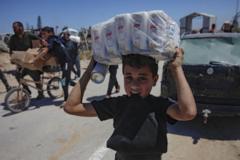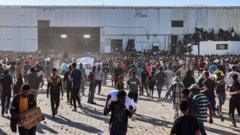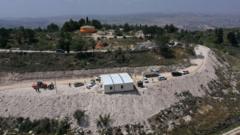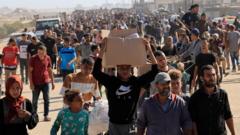Amid rising tensions and a critical humanitarian crisis in Gaza, a newly established aid distribution center saw thousands of Palestinians rush for supplies, resulting in chaos and allegations of inadequate organization. The controversial Gaza Humanitarian Foundation faced immediate challenges as crowds surged past security measures despite warning shots fired by the Israeli military.
Chaos Erupts at New Aid Distribution Site in Gaza as Thousands Rush for Supplies
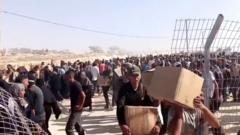
Chaos Erupts at New Aid Distribution Site in Gaza as Thousands Rush for Supplies
A scene of desperation unfolded in Rafah, Gaza, as crowds overran an aid distribution site operated by a US-backed group that has faced criticism for its handling of humanitarian efforts.
In a striking display of desperation, thousands of Palestinians rushed a food distribution center in Gaza set up by the Gaza Humanitarian Foundation (GHF), a US and Israeli-backed group, shortly after it commenced operations. The frenetic scenes unfolded in the southern city of Rafah, where pedestrians were seen climbing over dismantled fences as they hurried toward aid meant to alleviate deteriorating conditions exacerbated by a prolonged Israeli blockade.
Videos captured the chaotic moments as individuals, including children, hurried into the GHF compound, prompting the organization to acknowledge that their team had to fall back at one point due to the overwhelming numbers seeking assistance. Nearby, Israeli troops reportedly fired warning shots in an attempt to maintain order.
The GHF was established to provide an alternative to the United Nations as the primary supplier of aid in the region, amid warnings from experts about impending famine due to the 11-week blockade that was recently lifted. The UN has deemed the footage from Rafah as "heartbreaking" and is prepared with a detailed strategy aimed at delivering sufficient aid to Gaza's 2.1 million residents. However, multiple aid organizations have rejected cooperation with GHF, arguing that the group's methods undermine humanitarian principles and represent a "weaponization" of aid. Concerns were also raised regarding the negative impacts GHF’s operations might have on vulnerable populations, potentially excluding those with limited mobility and instigating greater displacement.
Following the initial distribution announcement on Monday, GHF reported distributing around 8,000 food boxes, each capable of sustaining about five-and-a-half people for a little over three days. However, the group disclosed that the process faced significant delays as a result of blockades imposed by Hamas. A GHF spokesperson noted, "The needs on the ground are great," emphasizing the logistical challenges faced by aid providers.
In response to the escalating chaos, one witness described the distribution effort as "humiliating," while others echoed sentiments of despair regarding dire food shortages. "People are exhausted – willing to do anything, even risk their lives – just to find food and feed their children," asserted a woman amidst the turmoil.
The Israeli Defense Forces (IDF) confirmed that their troops fired warning shots during the distribution. They outlined that control over the situation had been established and anticipated that food distribution would proceed as planned without compromising safety.
Despite the attempts to remedy the dire conditions, criticisms persisted. The UN's spokesman commented on the GHF distribution, labeling the circulating footage as lamentable and reaffirming the need for globe-compatible humanitarian protocols to guide aid delivery. The US State Department described the UN's statements as hypocritical, underscoring the urgency of getting aid to those in need without focusing solely on methodical disagreements.
The GHF has set an ambitious goal of distributing food to a million people in Gaza—a figure representing nearly half of the population—over the next few days. However, achieving this goal is contingent on several factors, including the security measures implemented by the group, which involve identity checks and the presence of armed American security contractors along with Israeli troops.
Internal strife has also affected the group, as Jake Wood, GHF's executive director, resigned before the distribution began, citing concerns over the operational integrity and adherence to humanitarian principles. The GHF board dismissed the criticisms while alleging persistent threats from Hamas targeting entities that support their distributions.
As the humanitarian situation continues to evolve amidst ongoing conflict, the Israeli military and GHF face mounting pressure to facilitate effective aid delivery while navigating complex humanitarian and political landscapes in a region long plagued by strife.


